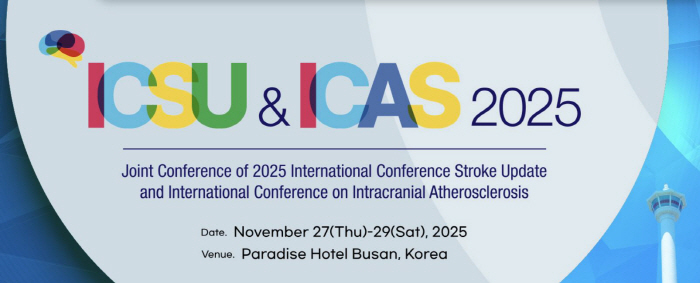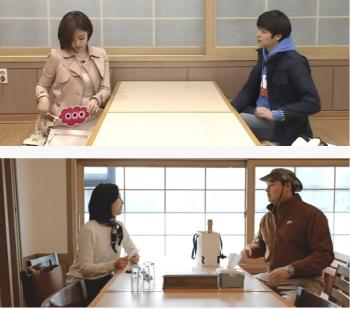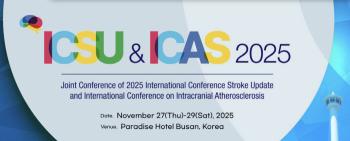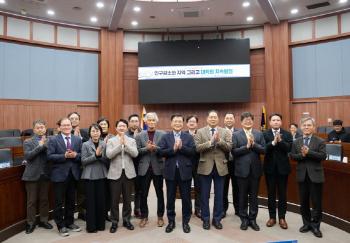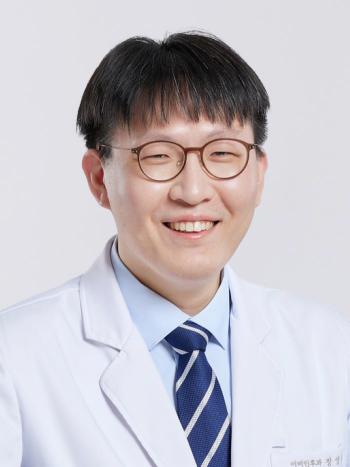The Korean Stroke Association co-hosts ICSU & ICAS at the 2025 International Academic Conference
Nov 20, 2025
The Korean Stroke Association (Chairman Hwang Sung-hee, Sungkyunkwan University, Chairman Kim Kyung-moon) will be in Busan for three days from the 27th to the 29thIt announced that it will co-host 'International Conference Stroke Update & International Conference on Intracranial Atherosclerosis 2025 (ICSU & ICAS 2025)' at the ISHOTEL.
Until now, ICSU has been held as a solo academic conference, but this year is the first time it will be co-hosted with ICAS. The conference organized a broader and more in-depth academic program by combining the expertise and strengths of the two conferences"It will be an enhanced venue for sharing and discussing the latest research results with domestic and foreign experts."
About 634 people (113 from overseas) from 23 countries, including the United States, Australia, Taiwan, Japan, China, and Greece, including South Korea, will participate in the joint academic conference. The Korean and foreign scholars who participated will deal with various topics such as △ treatment of ultra-high-level cerebral infarction using Tenecteplase, which was recently approved for use by the Ministry of Food and Drug Safety, △ diagnosis and treatment of patients with cerebral infarction of unknown cause △ latest treatment guidelines and medication for major risk factors for stroke such as hypertension and hyperlipidemia. Lectures by domestic and foreign experts, including 16 invited foreign performers, will be continued.
The keynote lecture at the conference is conducted by Professor George Ntaios of Aristotle University in Greece and introduces the latest research on the theme of 「Cure and management of patients with cerebral infarction of unknown cause」. Professor Li Ping Liu of China's Capital Medical University presents the latest findings in the treatment of cerebral infarction reperfusion, while Professor Carlos Molina of Spain's Val de Hebron Hospital will give a special lecture on the role of tenecteplase in intravenous thrombolysis'. During the conference, a total of 211 research papers will be published by domestic and foreign researchers, and active academic exchanges will take place.
In particular, the policy session, which will take place on November 28, will examine the operation status of stroke centers in Korea and discuss ways to improve the system to bridge gaps between regions and establish an efficient treatment network.
In addition, the symposium of the Korean Stroke Genome Research Society deals with the latest trends in dielectric-based big data research and genetic factors of stroke. In addition, in stroke-specialized nurse sessions, practical-oriented education such as the cause of stroke, secondary prevention, and risk factor control is provided.
The Korean Stroke Association has held international academic conferences since 2012 and has continued close academic exchanges with major stroke societies and research teams around the world. Chairman Kim Kyung-moon (Sungkyunkwan University of Medicine, Department of Neurology) said "ICSU & ICAS 2025 will greatly contribute to the understanding of stroke and improvement of treatment level."We also plan to provide various networking opportunities for active exchanges between domestic and foreign researchers and clinicians.'
Until now, ICSU has been held as a solo academic conference, but this year is the first time it will be co-hosted with ICAS. The conference organized a broader and more in-depth academic program by combining the expertise and strengths of the two conferences"It will be an enhanced venue for sharing and discussing the latest research results with domestic and foreign experts."
About 634 people (113 from overseas) from 23 countries, including the United States, Australia, Taiwan, Japan, China, and Greece, including South Korea, will participate in the joint academic conference. The Korean and foreign scholars who participated will deal with various topics such as △ treatment of ultra-high-level cerebral infarction using Tenecteplase, which was recently approved for use by the Ministry of Food and Drug Safety, △ diagnosis and treatment of patients with cerebral infarction of unknown cause △ latest treatment guidelines and medication for major risk factors for stroke such as hypertension and hyperlipidemia. Lectures by domestic and foreign experts, including 16 invited foreign performers, will be continued.
The keynote lecture at the conference is conducted by Professor George Ntaios of Aristotle University in Greece and introduces the latest research on the theme of 「Cure and management of patients with cerebral infarction of unknown cause」. Professor Li Ping Liu of China's Capital Medical University presents the latest findings in the treatment of cerebral infarction reperfusion, while Professor Carlos Molina of Spain's Val de Hebron Hospital will give a special lecture on the role of tenecteplase in intravenous thrombolysis'. During the conference, a total of 211 research papers will be published by domestic and foreign researchers, and active academic exchanges will take place.
In particular, the policy session, which will take place on November 28, will examine the operation status of stroke centers in Korea and discuss ways to improve the system to bridge gaps between regions and establish an efficient treatment network.
In addition, the symposium of the Korean Stroke Genome Research Society deals with the latest trends in dielectric-based big data research and genetic factors of stroke. In addition, in stroke-specialized nurse sessions, practical-oriented education such as the cause of stroke, secondary prevention, and risk factor control is provided.
The Korean Stroke Association has held international academic conferences since 2012 and has continued close academic exchanges with major stroke societies and research teams around the world. Chairman Kim Kyung-moon (Sungkyunkwan University of Medicine, Department of Neurology) said "ICSU & ICAS 2025 will greatly contribute to the understanding of stroke and improvement of treatment level."We also plan to provide various networking opportunities for active exchanges between domestic and foreign researchers and clinicians.'
|
This article was translated by Naver AI translator.
